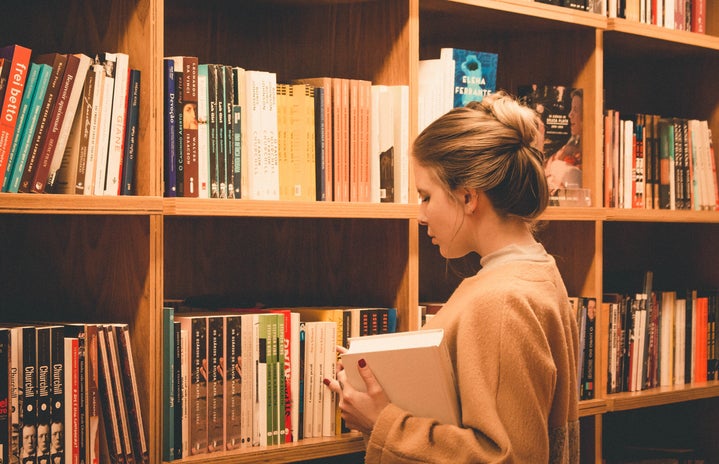In most of my English classes prior to college, almost all the “influential” and “classic” novels read were written by men. Rarely did we read books written by women, and many of them did not focus solely on the experiences of women. This created the impression that there wasn’t much academic or culturally significant literature written by women, which couldn’t be further from the truth. Lots of classic and modern female authors have important messages and impacts. Women’s History Month is a perfect time to support other women’s work and educate ourselves about the intersectionality and the history of feminism. These women are some of the most influential and my personal favorite feminist authors.
1) Toni Morrison
Toni Morrison sparked my interest in feminist literature and incorporating more women into my reading rotation. In one of my first English classes that emphasized the importance of female writers, we read Sula and Beloved. Even though both were emotional reads, they made me fall in love with Toni Morrison and her writing. My favorite book of hers is The Bluest Eye which is about a young Black girl living in Ohio in the 1940s and grappling with the hate society inflicts on her. This novel was heartbreaking on so many different levels, but like any good book provoked thought about many aspects of the Black female experience in the past and present. Not only is she my favorite writer of all time, but she is decorated with many awards such as the Nobel Peace Prize and Pulitzer Prize for her writing. I would argue that Morrison is not only a great female writer, but one of the greatest American writers of the 20th century.
2) Angela Davis
You may already know Angela Davis for her activism and involvement in the Black Panther Party. Not only was Davis an important figure in the civil rights and feminist movements, but she is also a great writer. Most of her works are academic non-fiction, which isn’t what I typically read in my free time. Still, I picked up one of her most famous works, Women, Race, and Class, and have learned so much from it. The book talks about the women’s liberation movement starting from the abolitionists, and how racism and classism have slowed the progress. Davis has multiple other books and essays touching on feminism and racism that I hope to read in the future. Just reading one of her books provided a much more three-dimensional and complex understanding of the history of the feminist movement.
3) Sylvia Plath
Sylvia Plath recently came into my collection after seeing continuous recommendations on social media to read The Bell Jar. In this novel, she talks about a woman’s struggles with mental illness and the impacts it has on her physical and emotional health. It is easy to see the parallels between the main character and Sylvia Plath as they are both academics in Boston with mental health issues. The book came at a time when mental health was still stigmatized and many including Plath were sent to mental institutions where they were faced with horrifying treatments such as electroshock therapy. The Bell Jar not only talks about mental health but how societal pressures and dangers women face can deteriorate a woman’s psyche. Unfortunately, Plath had an early death due to her struggles with mental illness, but her writing and impact continue to live on.
4) Audre Lorde
Audre Lorde was introduced to me this year when I read an excerpt of one of her writings in a sociology class. After reading, I became more interested in who she was and her other writings. One of her most significant works is an essay collection titled Sister Outsider. The essays recount her experiences being a Black gay woman in America. In these essays, she also calls out the mainstream feminist movement for being exclusionary based on race and sexuality. Lorde is both an important writer and an example of courage, as being an outspoken Black openly lesbian woman in the 1970s was far from easy. Her work paved the way for and demanded more intersectional feminism that included queer and Black women.
5) Chimamanda Ngozi Adichie
One of my favorite modern feminist writers is Chimamanda Ngozi Adichie. Her most famous work is Half a Yellow Sun, a story about Igbo sisters and the horrors they face during the Biafran Civil War in Nigeria. I later found out about Dear Ijeawele, or a Feminist Manifesto in Fifteen Suggestions and We Should All Be Feminist, her other book and essay that focuses on feminism. I personally love the format of Dear Ijeawele, or a Feminist Manifesto in Fifteen Suggestions, as it is a series of suggestions Adichie made in response to a friend asking her how to raise her daughter to be a feminist. Adichie has already achieved so much success at 45, and I’m excited to see what she continues to write. She provides an international, specifically African, perspective on feminism. This perspective is refreshing because sometimes we tend to look at feminism through just an American or Western lens.
By reading just some of the books by the feminist authors above, I have widened my perspective and horizons about what feminism and being a woman mean. They’ve allowed me to look at a variety of different barriers and experiences women have that differ from my own. Not only are these authors great and engaging writers, but they are activists with their own unique and fascinating life stories. I hope to read and learn more from these authors and other influential women, and I hope you do too!


